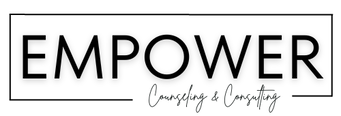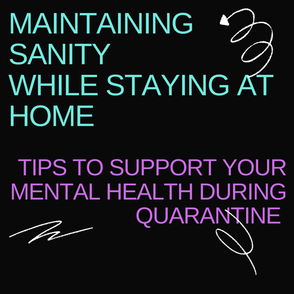I don't have a list of 10 things for you to do today to deal with these emotions. I'm just in need of space to acknowledge mine and hopefully validate yours. Today, I lost a piece of me.*
Many things make up who we feel we are- relationships, career, faith, friendships, etc. And today I lost a piece of who I have been that I really loved and thought would be a part of my life for a lot longer. I'm not going to lie- it sucks. All of this was my decision, my choice. A hard choice no doubt, but a necessary one. I took my time in making this decision- I prayed about it, did my pros and cons list, talked it out with someone I trust. I know it's for the best but right now it feels gross and awkward and heavy. We talk about boundaries in the mental health world a lot- how hard they are to set and even harder to enforce. Even identifying the need for a boundary can seem foreign if you were never modeled healthy boundaries growing up. We anticipate the push back we might receive but it always seems to come with a promise of eventual relief and better balance in life. We prepare ourselves for that. I think we miss something though. I don't think we talk enough about what hard emotions to expect on our end that come with setting a necessary boundary. We prepare ourselves for the other party's emotions (their anger, testing of the new boundary, not understanding your reasoning, etc), but not for our own. Today I am recognizing that I didn't expect to be grieving right now, which brings such a range of emotions. Any loss or unmet expectation can cause grief and that's what this is, so how did I not expect it? I'm sad I needed to set this boundary and disappointed that my expectations were so incorrect. I'm angry too. I don't feel good enough. I wasn't prepared for this. I asked my IG friends what unexpected emotions they felt after setting a boundary and this is what I got: Fear Loss of security Guilt x 10 Sad Mad Instant recoil Grief (me) I don't have a list of 10 things for you to do today to deal with these emotions. I'm just in need of space to acknowledge mine and hopefully validate yours. And also to remind us both that as hard as this can be, as much as it sucks, it's still the thing that needs to be done. You can't always anticipate how something is going to feel before it happens, but I think offering yourself space to explore can ease some discomfort later. If this resonates with any of you, what were your experiences like? I would love to hear what you felt and how you worked through it. *I feel the need to say "I know that sounds dramatic" here. Why do I feel like sounding dramatic means I'm taking up too much space? At least it got moved to a footnote this time, instead of first paragraph. #progress
1 Comment
The point of the quarantine is to be proactive in protecting other, more vulnerable populations. This is an act of love. It's Day One for me of our 2020 Quarantine and I'm already in need of a plan to protect my sanity. We live in a society that struggles with sitting still as it is (I'm totally guilty of this too) and the idea of needing to be at home for the foreseeable future is scary. So I'm putting together a list of things that I plan to do to protect my mental health and make the best of a tough situation. **Before I dive into my tips, can I please point out that I am not quaranteening myself out of FEAR. Quite the opposite. The point of the quarantine is to be proactive in protecting other, more vulnerable populations. This is an act of love. It would be selfish of me to try to keep on with business as usual. We have to protect elderly people at all cost.** 10 Tips to support your mental health during quarantine: 1- Keep a schedule.
I'm an Enneagram 3 so this is probably more important for me than for some others, but having a routine to structure my day is so important. If I sleep in, my whole day is off. If I don't know what I'm supposed to do, I feel lost. So I'm setting my alarm every morning, getting dressed and putting on makeup, eating meals at regular times, and I have an end time to my work day. Even if it's earlier than normal, there needs to be a time that you are "done" for the day just like any other day. 2- Make a To-Do list. This keeps me on track for the day and helps me prioritize my time. For those that are scrambling with more work than is feasible to do in a day or for those that have found themselves homeschooling (prayers up for you guys!)- make a list of what needs to be done for the day, do it, and then log off (physically and mentally). I know everyone's situation is different right now, but please protect your mental health by setting boundaries wherever you can. 3-Do things you have been putting off. For those of you that are not overwhelmed with work and you are trying to find ways to fill your time- tackle the things you have been procrastinating on. It's the perfect time! Imagine how good it will feel to have those things off of your plate when things do go back to "normal." So Spring Clean, do the home project, clear out your inbox, etc. You will be so glad you did. 4-Remind yourself that downtime is okay. Like I said, we live in a culture that values being busy. We'll sleep when we're dead. The grind never stops. And let me tell you- we are paying a high price for it. Maybe this is a good time to re-evaluate how we view downtime and embrace the NEED for mental health care. I encourage everyone to play around with some sort of daily quiet time such as journaling, meditation, or reading. If you find it difficult to sit in silence, I am going to venture to say you have some level of underlying anxiety and now is a good time to address it. If you want to learn what constant stress is doing to your body, I recommend the book Why Zebras Don't Get Ulcers by Robert M. Sapolsky. 5-Check on others. "Social distancing" doesn't mean social isolation. Use this time to check on those that you love. Reconnect with an old friend. Offer assistance to an elderly neighbor. We have so much technology that allows us to continue to get our social needs met but you have to be proactive! 6- Help others. We all have different challenges to work through here, but it's important to be aware that many people aren't just being "inconvenienced" right now. People are actually suffering. This is yet another example of how people living in poverty take the biggest hit and are so vulnerable. There are many creative ways to show love and support here! Find a local charity to donate to, use your power to ease the burdens of others (can you waive late fees? Delay evictions? Give your employees extra PTO?), offer to grocery shop for elderly neighbors so that they don't expose themselves to public places. Anything you can do will help. And side note- there's plenty of research that shows volunteering is good for YOUR mental health- so you are helping yourself out as you help others. 7-Find the good in the bad. I think this is so important. Focusing on the good doesn't mean living under a rock and minimizing the importance of what's going on. It is reminding yourself that EVERYTHING is not bad and it never is. Find some way to focus on what good things are happening. I personally am relying on memers for this right now and can't stop laughing when I scroll IG. And I need that. 8-Pace yourself. At this point we really don't know what the future holds. I'm hopeful and optimistic that we will not be quarantined for months (I am also PRAYERFUL for this- can we all agree that this needs to be happening daily?) Regardless of how long this last, let's all pace ourselves. If you knock out every project and to-do list in the first week, you are setting yourself up for a breakdown later on. If you let your mind run away with panic that this could last all summer, you could cause unnecessary anxiety. Let's all try to take it a day at a time. 9-Move and hydrate. Please move and hydrate. Do a home workout. Stretch. Drink water. Care for your body. 10- Remember, everyone is different. Please be kind to others. Everyone is having a different experience with this. People can't visit their loved ones in nursing homes. People are struggling to find daycare options. People are being furloughed and don't know how they are going to pay bills. People are working overtime to keep shelves stocked. People are in recovery and have limited access to support. We all need different things at this time but what nobody needs is to be judged, yelled at, or told they aren't handing this correctly. You are not an expert on other people and neither am I. This is MY list- I hope you take the time to make your own according to your circumstance, personality, and family situation. This is a chance we have to all be in this together and show love to our fellow human. And if there is any way that I can support you- please reach out. I'm happy to do what I can. With so much love, Julie (like, omg if I could just let it go DON’T YOU THINK I WOULD??) I recently posted a poll asking for suggestions on topics to explore together and the overwhelming response was anxiety. I’m honestly not surprised about this. Our society is dripping with anxiety, especially the past few weeks over the Coronavirus and how the average adult seems to not normally wash their hands very often. Whether you are feeling panicked about that or not, anxiety is a feeling that the majority of us can relate to.
I figured this would be a good intro topic for a mental health blog. First thing- like so many other words, we overuse the word “anxiety.” I need to make sure to point out to those of you that have never experienced true anxiety that it is not simply feeling nervousness or worry. Everyone has felt those things at some point, but not everyone has experienced anxiety. So please keep in mind that saying “It’s going to be okay” and “Just let it go” or my personal favorite “You just need to give it to God” are extremely unhelpful and invalidating (like, omg if I could just let it go DON’T YOU THINK I WOULD??) On the flip side, anxiety does not always look like a panic attack either. Many people deal with anxiety on almost a daily basis and have never experienced it as a full blown attack. That also should not invalidate what you are feeling and saying “Well it’s not that bad” to yourself is not helpful. There is no need to judge or compare our intensity- if it is distressing then you deserve help. Another point worth noting is that people struggling with anxiety often cannot tell you what it is tied to. Why am I feeling anxious? I have no idea and not knowing only exasperates the feeling. It also makes it feel harder to “fix” (without a therapist) because you are not sure of the source- however there are some universal coping skills that can help regardless of the origin that I will share in a bit. Anxiety also presents very differently for everyone. Here are some common symptoms of anxiety: Racing thoughts Sweaty palms Heart racing Negative self talk Panic attacks Shortness of breath Insomnia/Hypersomnia Irritability (this is often how mine presents and it took me a very long time to recognize that) Loss of or increase in appetite Feeling overwhelmed This is not a complete list by any means and I encourage you to make your own so that you can identify your own list of symptoms. You will hear me say this over and over, but I believe that awareness of a problem is half of the work. If you can work to increase your awareness (what, when, why, and how you are experiencing something) consistently, you will be able to work through it more effectively. Let’s start with some journaling prompts: What am I feeling right now? (see list of symptoms above or add your own) How intense am I feeling this from 1-10? Where do I feel it in my body? (Headache, tension, heart racing, tingling) How long did this feeling last? After you spend a few days asking yourself these questions and logging your answers, most people start to notice trends and patterns. Maybe it’s before work that you notice negative self talk increasing, at night you get antsy, or perhaps before seeing a particular family member you have a knot in your stomach. Once you notice a trend you can come up with a plan. 1- Get a therapist. (Why don’t you have one already? You have a PCP, right?) You should not have to deal with this alone. Even if your anxiety is not impairing your daily function, get a therapist. I use EMDR for anxiety and it works wonders. When you are searching for a therapist, specifically ask if they are EMDR trained because you will want this! More info on EMDR is coming in another blog post soon. 2- Build your toolbox of coping skills. 3- Make tough decisions. Do I need to set new boundaries (ooh wee...that's another hot topic) that will be hard in the beginning but help me in the long run? Do I need to change jobs? Do I need to change my DIET (Yes, girl. Diet has a HUGE impact on anxiety. More on that later.) So now that you have all of this awareness and you are waiting for your first appointment with your therapist, what to do in the meantime? Here is a short list of my favorite grounding techniques. For those of you interested in the science behind these, in short- anxiety activates your sympathetic nervous system. That’s the adrenaline rush, increase in heart rate, ready to run feeling you have. You want to calm that down and engage the parasympathetic system so that you can decrease those responses. That’s what these techniques do. Deep breathing- by far the easiest and most popular technique I would say. There are several simple breath counts that work but you have to find the one that is most effective for you. While you are counting breaths, try to only focus on what you are doing. Close your eyes and visualize your lungs expanding and contracting. 4 Square- think of drawing a square while you counting breaths. 4 counts in, hold at the top for 4, another 4 counts out, hold at the bottom for 4. When you are holding- don’t act like you are underwater, just gently sit with the inhale or exhale before moving to the next. 4, 7, 8- 4 counts in, 7 count hold, 8 counts out. The exhale engages the parasympathetic system, so the longer you spend exhaling vs inhaling, the more effective it will be. Belly breathing- regardless of which counting technique you use, you want to breath not just from the lungs but all the way through your abdomen. Sit with a straight back and place one hand on your chest and one on your belly. When you inhale, feel the breath come completely through your lungs and belly- you want to feel both expand. Then exhale to empty both. Acupressure points- if you are in a meeting and can’t close your eyes and belly breath (because that could be awkward, right?) you might want to learn about acupressure points. There are certain pressure points on your body that taking deeper breaths and massaging these spots can help to engage the parasympathetic system as well. The easiest pressure point is on your hand between your thumb and index finger. Gently massaging that soft point can be calming and the more you practice it, the more effective it will be. I have plenty of other coping skills that I plan to share, but starting with these is a great way to begin a mindfulness practice of managing your anxiety. At the end of the day, knowing you are not in this alone is so important. You aren’t. And you deserve help. Finding a community (like this one) that supports working through these issues with no shame and judgement is vital. I would love to connect and hear your experiences too! What helps you during anxious moments? |
Julie
|
Proudly powered by Weebly




 RSS Feed
RSS Feed